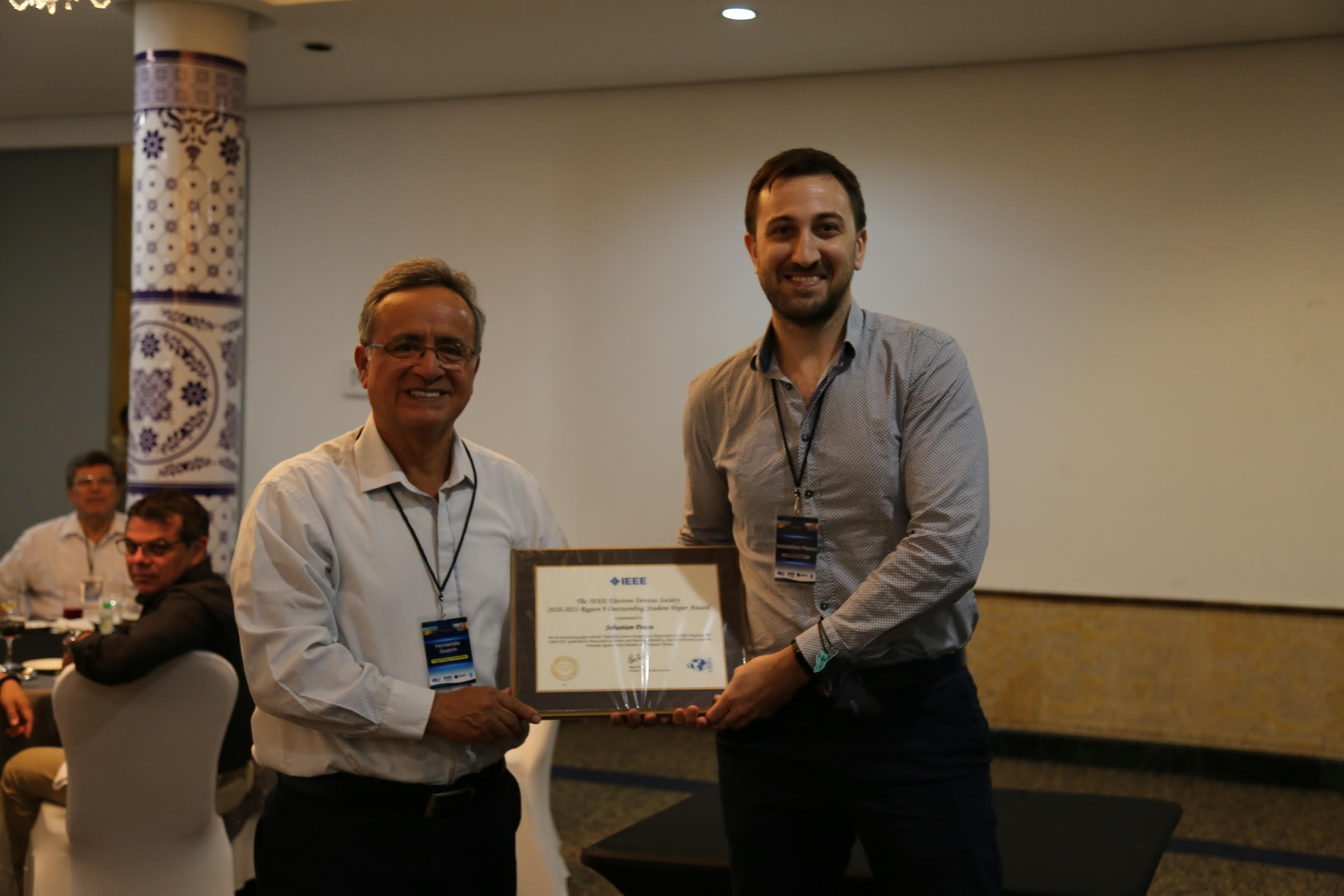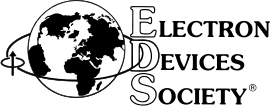Region 9 Biennial Outstanding Student Paper Award
Region 9 Outstanding Student Paper Award Committee
Description: Awarded to promote, recognize, and support meritorious research achievement on the part of Region 9 (Latin America and the Caribbean) students, and their advisors, through the public recognition of their published work, within the Electron Devices Society’s field of interest.
Prize: A distinction will be conferred in the form of an Award certificate bestowed upon the most outstanding Student Paper nominated for the two-year period. The prize will be presented at either the Latin American Electron Devices Conference (LAEDC) or the Symposium on Microelectronics Technology and Devices (SBMicro). In addition to the recognition certificate, the recipient will receive a subsidy of up to $1,500 to attend the conference, where the award is to be presented. There will be a formal announcement of the winner in a future issue of the EDS Newsletter. The winner will also receive up to three years of complimentary IEEE and EDS student membership, as long as winner remains eligible for student membership.
Eligibility: Nominee must be enrolled at a higher education institution located in Region 9. In the case of a co-authored paper, only eligible co-authors may be nominated. Papers should be written in English on an electron devices related topic. Papers should have been published, in full-feature form, during 2022-2023 in an internationally recognized IEEE sponsored journal or conference in the field of electron devices related topics. Statements by the student and by the faculty advisor should accompany the nomination. Nominator must be an IEEE EDS member. Previous winners of this award are ineligible. There must be a minimum of five nominations submitted in order for the award to be administered for that year.
Basis for Judging: Demonstration of Nominee’s significant ability to perform outstanding research and report its results in the field of electron devices. Papers will be judged on: technical content merit, originality, structure, clarity of composition, writing skills, overall presentation. These criteria will be weighted by the assessment of the nominee’s personal contribution and the linkage of the nominated work to the nominee’s career plans.
-
Nomination packages are due at the EDS Executive Office no later than February 15, 2024 Extended to May 1, 2024
-
Winners will be notified by June 2024
-
Recipients may choose to have the formal presentation of the award at either one of the conferences: LAEDC or SBMicro
Although the IEEE Electron Devices Society (EDS) is pleased to invite all individuals and groups in the OFAC embargoed countries to submit nominations for IEEE EDS Awards, the IEEE EDS cannot provide any award monies to members from such countries at this time.

Congratulations to Sebastian Pazos on his winning paper
Reliability-Aware Design Space Exploration for Fully Integrated RF CMOS PA
Winners of the EDS Region 9 Biennial Outstanding Student Paper Award
| Year | Paper Title | Winning Author |
|---|---|---|
| 2020-2021 | Reliability-Aware Design Space Exploration for Fully Integrated RF CMOS PA | Sebastian Pazos |
| 2018-2019 | Reconfigurable NanoFETs: Performance Projections for Multiple-Top-Gate Architectures | Rebeca Moura |
| 2016-2017 | A DC Method to Extract Mobility Degradation and Series Resistance of Multifinger Microwave MOSFETs | Andrea Sucre-Gonzalez |
| 2014-2015 | Modeling the Impact of Multi-Fingering Microwave MOSFETs on the Source and Drain Resistances | Fabián Zárate |
| 2012-2013 |
Surface-Potential-Based Drain Current Analytical Model for Triple-Gate Junctionless Nanowire Transistors
|
Renan Trevisoli Doria |
| 2010-2011 | None | None |
| 2008-2009 | Inclusion of Direct Tunneling Gate Current in the Symmetric Doped Double Gate MOSFETs Model | Salvador Ivan Garduno Vertiz |
| 2006-2007 | A Multi-Sampling CMOS Image Sensor in Time-Domain with Synchronous Readout Circuit | Fernando de Souza Campos Ognian Marjnov Naser Faramarzpour Faycal Saffih M. Jamal Deen Jacobus W. Swart |
| 2004-2005 | Analytic Solution of the Channel Potential in Updoped Symmetric Dual-Gate MOSDETS | Slavic Malobabi Adelmo Ortiz-Conde Francisco Garcia-Sanche |
| 2002-2003 | The Integral Function Method: A New Method to Determine the Nonlinear Harmonic Distortion Modeling and Simulation of Static Characteristics of a PMOS Compatible Hot Wire Principle-Based Flow Micro Sensor |
Miguel A. Aleman-Acre Antonio Cerdeira Magali Estrada Denis Flandre Bertrand Parvais Gonzalo Picun Adeilton C. Oliveira Jr. Ioshiaki Doi Jose A. Diniz Jacobus W. Swart Eliphas W. Simoes |







